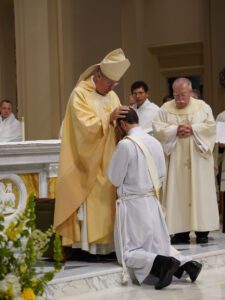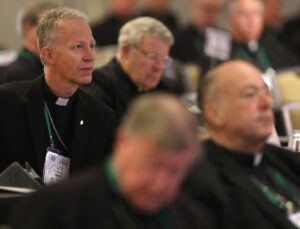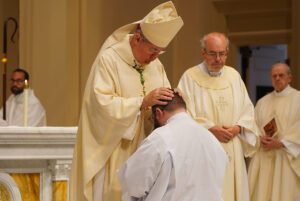SCRANTON – As he stood in the first pew of the Cathedral of Saint Peter, Joseph Boris, Sr., fought back tears as his son, Michael, gave him his first blessing just moments after his ordination to the priesthood.
“It meant so much. It was just an overwhelming feeling,” Joseph Boris said.
Five years after entering Saint Mary’s Seminary in Baltimore, Michael J. Boris was ordained a priest on Saturday, June 24, 2023, before hundreds of family, friends, fellow parishioners and clergy.

“I loved seeing friends and family, some friends which I haven’t seen in a very long time, and most especially brother seminarians, and now brother priests, who have, in various ways, been part of my journey and have helped me try to surrender to Christ for this moment,” Father Boris said shortly after the Ordination Mass ended.
During the Ordination Rite, Boris prostrated himself before the Cathedral altar as the congregation chanted the Litany of the Saints. The Rite also included the Laying on of Hands, Anointing of Hands and the Fraternal Kiss — ancient rituals that signify his incorporation into the presbyterate.
Boris said the Laying on of Hands was particularly moving.
“I was moved and trying to reflect when the Bishop and then the other priests came and were laying their hands on my head. I was trying to picture how each and every one of them is Christ laying his hands on my head and trying to soothe my anxieties and heart, ultimately saying, ‘I’ve called you to this and I will be with you always,’” the newly ordained priest said.
Boris, 27, is the son of Joseph and Susan Boris. The Dallas native is a graduate of Holy Redeemer High School and King’s College where he earned a Bachelor of Arts in Theology and Philosophy. Boris entered Saint Mary’s Seminary in the fall of 2018. In 2019, he served a summer assignment in the parish communities of Holy Cross Parish, Olyphant, and Blessed Sacrament Parish, Throop. Boris also served a pastoral year (2020-2021) in the parish communities of Saint Rose of Lima Parish and Our Lady of Mount Carmel Parish, both in Carbondale.
“Two of the greatest things I’ve been thinking about recently were looking out at the crowd both at Adoration last night and here today and seeing all the people who have been part of my journey and their Christian witness and how they’ve helped me discern in various ways,” Father Boris added. “Everybody from my parishes, schools, King’s College, seminary at Saint Mary’s in Baltimore. They have all been spectacular and I’m very grateful.”
The Most Reverend Joseph C. Bambera, Bishop of Scranton, served as principal celebrant and homilist of the Ordination Mass.
Bishop Bambera began his homily by thanking Boris for saying “yes” to the Lord’s Call to serve the church.
“Your consent to God’s will, that has brought you to this day in your life and the life of this local church, affirms that the power of God continues to move among us and affect God’s plan for salvation,” the bishop said.
The Ordination Mass was held on the Solemnity of Saint John the Baptist and provided context, as Bishop Bambera noted, for a person’s response to the call of the Lord.
“John was the bridge between the Old and New Testaments, the prophet whose entire purpose in life was to point the way to Christ,” Bishop Bambera explained. “He understood and accepted God’s will for himself and he embraced it with humility and resolve.”
Being a priest demands the same response and more.
“While very much aware of our human weakness and frailty, God will use you, even with your imperfections to speak on His behalf and serve in His name for the sake of His people,” Bishop Bambera added.
As he ended his homily, the Bishop told Boris to always trust in the grace of God, be faithful to the teachings of the church and to remember he is appointed to serve on behalf of the Christian faithful but will always be in need of God’s presence, life and saving grace.
“God’s people are looking for meaning, purpose and peace in their lives. Today, here in this Cathedral and beyond, they will celebrate your response to the Lord’s call.
They will encourage you and embrace you with pride,” Bishop Bambera said.
“Tomorrow, they will look to you for answers to their questions and they will look to you to find Jesus in your words of forgiveness, in your service to the poor and the simplicity of your life and in the depth of your love.”
Throughout the Ordination Mass, Joseph Boris was filled with pride for his son.
“I just wish my mom and dad could be here and Sue’s mom and dad. This is something my mom prayed for a long time,” the new priest’s father said. “I have seven brothers and sisters and I think she was disappointed when none of us went into the priesthood. She was thrilled. She lived until a couple years ago and got to see Michael at the seminary. She was so proud of that.”
Over the last five years, Father Boris’ father said his son has grown in many ways.
“He is a totally different person. We know him as the goofball kid growing up, having fun, playing basketball,” his dad said. “He has really blossomed into somebody that I know will do great things. He will be a great priest.”
Father Boris’ first priestly appointment is historic. He has been appointed as Parochial Vicar at both Our Lady of the Snows Parish, Clarks Summit, and Saint Gregory Parish, Clarks Green. While the two neighboring parishes are currently independent, they will be working towards coming together in a linkage next year, and being appointed to both parishes now will help towards that goal.
“I am excited. I’ve never been up there so I really am going in with a clean slate,” Father Boris said. “It feels good to have a fresh start, go to a place where I can serve God’s people and try to discern God’s voice every day.”


